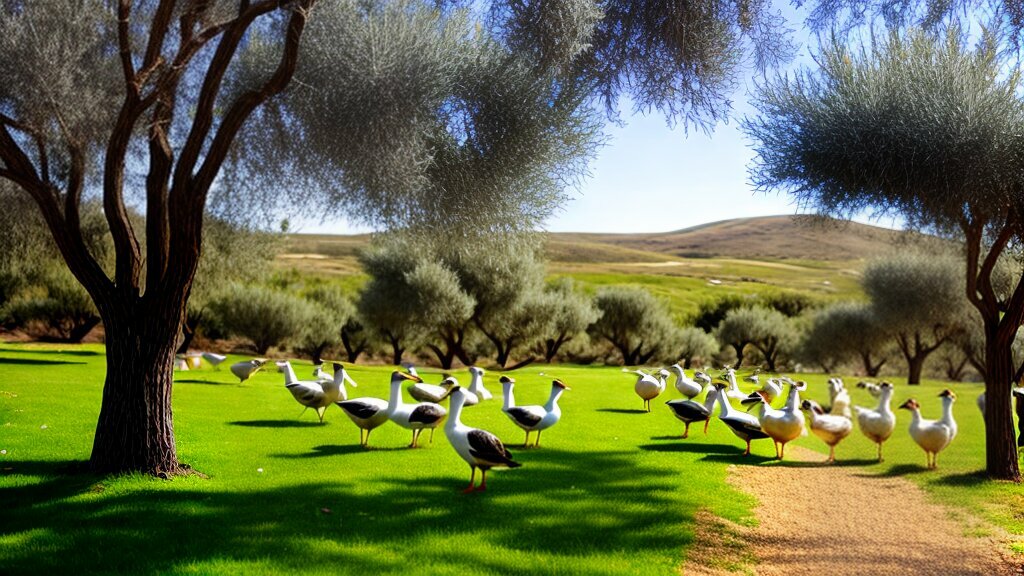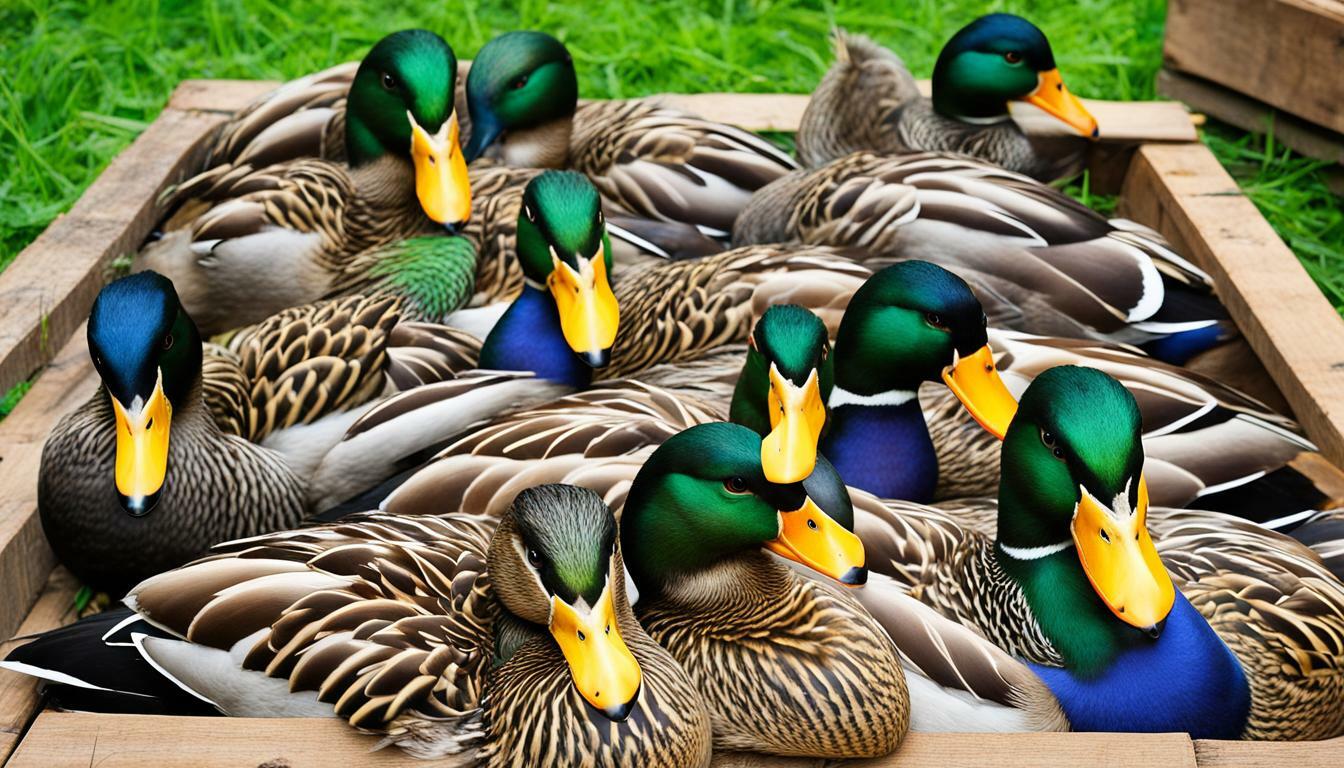Can Ducks Eat Olives?

Table of content:
Ducks are fun birds to have around ponds and backyard flocks. Their quacking, dabbling, and waddling make them entertaining to watch. As a duck owner, you want to make sure you’re feeding your feathered friends a healthy diet. You may wonder if treats like black olives are okay to give ducks. Black olives are common ingredients in many foods humans eat. But are olives something ducks can eat too?
Typical Duck Diet and Nutrition
In the wild, ducks eat a varied diet. This allows them to get a wide range of vitamins, minerals, and nutrients. Some key components of a duck’s natural diet include:
- Seeds – Ducks forage for seeds from grasses, weeds, and aquatic plants. These provide protein.
- Insects – Ducks will eat insects like dragonflies, flies, grasshoppers, and aquatic invertebrates. These offer protein.
- Greens – Ducks graze on green leafy plants like duckweed, algae, and other aquatic vegetation. Greens supply nutrients.
- Grains – Ducks feed on grains from sources like corn, rice, wheat, and barley. Grains provide carbohydrates.
When caring for domestic ducks, it’s important to mimic their wild diet as much as possible. Offer a quality duck feed that contains a mix of seeds, pellets, and grains. Allow access to areas for foraging for insects and greens. This will help meet their nutritional needs.
Potential Benefits of Olives for Ducks
Olives grow on olive trees native to tropical and temperate regions. There are many varieties, but most olives fall into two main types – green and black. Here are some potential benefits black or green olives could offer ducks:
- Healthy Fats – Olives are high in oleic acid, a monounsaturated fatty acid. This healthy fat supports skin health, cholesterol levels, and immunity in ducks.
- Vitamin E – Olives contain good amounts of vitamin E, an antioxidant. Vitamin E promotes healthy tissues and cells in ducks.
- Iron – Olives provide iron which helps ducks make red blood cells and supports their energy levels.
- Other Vitamins and Minerals – Olives supply an array of other vitamins and minerals like A, C, K, copper, calcium, sodium, and phytonutrients. All these help support duck health.
So in small amounts, olives can be a nutritious treat for ducks and offer some benefits. But moderation is key.
Potential Risks of Olives for Ducks
While olives provide some nutritional value for ducks, they can also pose some risks, especially if overfed. Here are some potential downsides of feeding ducks too many olives:
- High Sodium – Olives are cured and pickled in brine, giving them very high sodium levels. Excess sodium is unhealthy for ducks.
- Phenols – Olives contain phenolic compounds that may be toxic to ducks in large quantities. Phenols can cause nerve, kidney, or gastrointestinal issues.
- Fat Content – The high fat content of olives could lead to obesity and liver issues if ducks eat too many.
- Choking Hazard – Whole olives may present a choking risk for ducklings and smaller duck breeds.
So olives should only comprise a very small part of a duck’s diet. Too many olives on a frequent basis can jeopardize a duck’s health.
Guidelines for Feeding Ducks Olives
Olives are okay for ducks in strict moderation. Here are some guidelines for safely feeding olives to ducks:
- Give Infrequently – Olives should be an occasional treat, no more than once or twice a week.
- Feed Small Amounts – For an adult duck, limit olive intake to 2-3 olives at a time, 1-2 times weekly. Adjust amounts down for younger or smaller ducks.
- Chop or Mash – Chop or mash olives into bite-size pieces for younger ducks to avoid choking. Remove pits, which can also be a hazard.
- Rinse Brine Off – Rinse and drain brined olives well to reduce excess sodium before feeding.
- Watch for Signs of Illness – Monitor ducks closely and discontinue olives if any signs of illness develop.
Following these precautions will allow ducks to gain benefits from olives safely. But olives should never become a dietary staple.
Black Olives and Ducks
Black olives are one of the most popular olive varieties. They are harvested when ripe and treated with an oxidizing agent like ferrous gluconate to turn them black. This enhances their flavor. How do black olives compare to green olives for ducks? Here are a few key points:
- Higher Sodium – Black olives tend to be saltier than green olives due to processing methods. This makes moderation especially important.
- Stronger Flavor – The more robust flavor of black olives may be off-putting to some ducks at first. But they may adapt to the taste over time.
- Denser Texture – Riper black olives have a fatter, denser texture than greener olives. This may influence chewing and digestibility for ducks.
- Same Nutrients – Aside from sodium levels, black and green olives have a very similar nutritional profile. Both offer the benefits mentioned earlier.
So black olives are fine for ducks following the same feeding guidelines outlined above. Limit intake, rinse to reduce sodium, and chop or mash them first for young ducklings. Monitor closely for any adverse effects.
Conclusion
Can ducks eat black olives? In small amounts, yes, black olives can be an occasional treat. Olives provide healthy fats, vitamins, minerals, and phytonutrients ducks can benefit from. But olives also contain compounds like sodium and phenols that can be toxic to ducks in excess.
Follow proper feeding guidelines – give olives sparingly, rinse them first, chop or mash for young ducks, and watch closely for any reaction. While not ideal everyday fare, the occasional olive can add variety to a duck’s diet safely when fed responsibly.
So feel free to share a few olives with your feathered paddling pals now and then! Just be sure moderation and common sense rule the day when supplementing a duck’s diet with people foods.
Welcome. I’m Adreena Shanum, the proud owner of this website, and I am incredibly passionate about animals, especially poultry. I founded adreenapets.com as a labor of love, stemming from my desire to share my knowledge and experiences with poultry enthusiasts worldwide.




